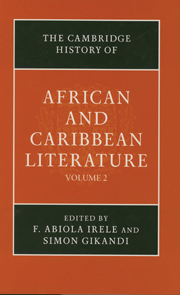Book contents
- Frontmatter
- 23 East African literature in English
- 24 Anglophone literature of Central Africa
- 25 West African literature in English: beginnings to the mid-seventies
- 26 South African literature in English
- 27 African literature in French: sub-Saharan Africa during the colonial period
- 28 North African literature in French
- 29 Francophone literatures of the Indian Ocean
- 30 African literature in Spanish
- 31 African literature in Portuguese
- 32 Popular literature in Africa
- 33 Caribbean literature in French: origins and development
- 34 Caribbean literature in Spanish
- 35 Anglophone Caribbean literature
- 36 The Harlem Renaissance and the Negritude movement
- 37 Postcolonial Caribbean identities
- 38 African literature and post-independence disillusionment
- 39 “Postcolonial” African and Caribbean literature
- 40 Modernism and Postmodernism in African literature
- Index
- References
28 - North African literature in French
Published online by Cambridge University Press: 28 March 2008
- Frontmatter
- 23 East African literature in English
- 24 Anglophone literature of Central Africa
- 25 West African literature in English: beginnings to the mid-seventies
- 26 South African literature in English
- 27 African literature in French: sub-Saharan Africa during the colonial period
- 28 North African literature in French
- 29 Francophone literatures of the Indian Ocean
- 30 African literature in Spanish
- 31 African literature in Portuguese
- 32 Popular literature in Africa
- 33 Caribbean literature in French: origins and development
- 34 Caribbean literature in Spanish
- 35 Anglophone Caribbean literature
- 36 The Harlem Renaissance and the Negritude movement
- 37 Postcolonial Caribbean identities
- 38 African literature and post-independence disillusionment
- 39 “Postcolonial” African and Caribbean literature
- 40 Modernism and Postmodernism in African literature
- Index
- References
Summary
The three arabophone and francophone nations of North Africa – Algeria, Morocco, and Tunisia – came under French colonial rule in the nineteenth century. Along with military, political, and economic domination, the French instituted a cultural and linguistic supremacy whose effects are still felt in the region today, even after forty years of independence. These three countries of North Africa are also collectively called the Maghreb (meaning “The west” in Arabic). Whereas Morocco and Tunisia had the administrative status of protectorates, Algeria was a colony. Before the end of the nineteenth century, Algeria was divided into three départements and declared an extension of French continental territory. Invaded by the French in 1830, Algerian independence was granted only at the conclusion of a violent conflict (1954–62), referred to as “the Algerian Revolution” by Algerians. Morocco and Tunisia received their independence from France in 1956, after several years of conflict that was often violent, but did not reach the same level of warfare as the Algerian Revolution.
The three countries of the Maghreb are distinct in terms of their political and cultural history, yet the shared experience of French colonization makes it possible to discuss them together, particularly concerning the development of French-language literature in the region. When the French conquered North Africa, they found a well-established Arabic literary tradition that had existed since the time of the Arab expansion into North Africa during the seventh century. But the French colonial endeavor depended upon a bureaucracy and an administrative mission in which French was the dominant means of communication.
- Type
- Chapter
- Information
- The Cambridge History of African and Caribbean Literature , pp. 552 - 568Publisher: Cambridge University PressPrint publication year: 2000

